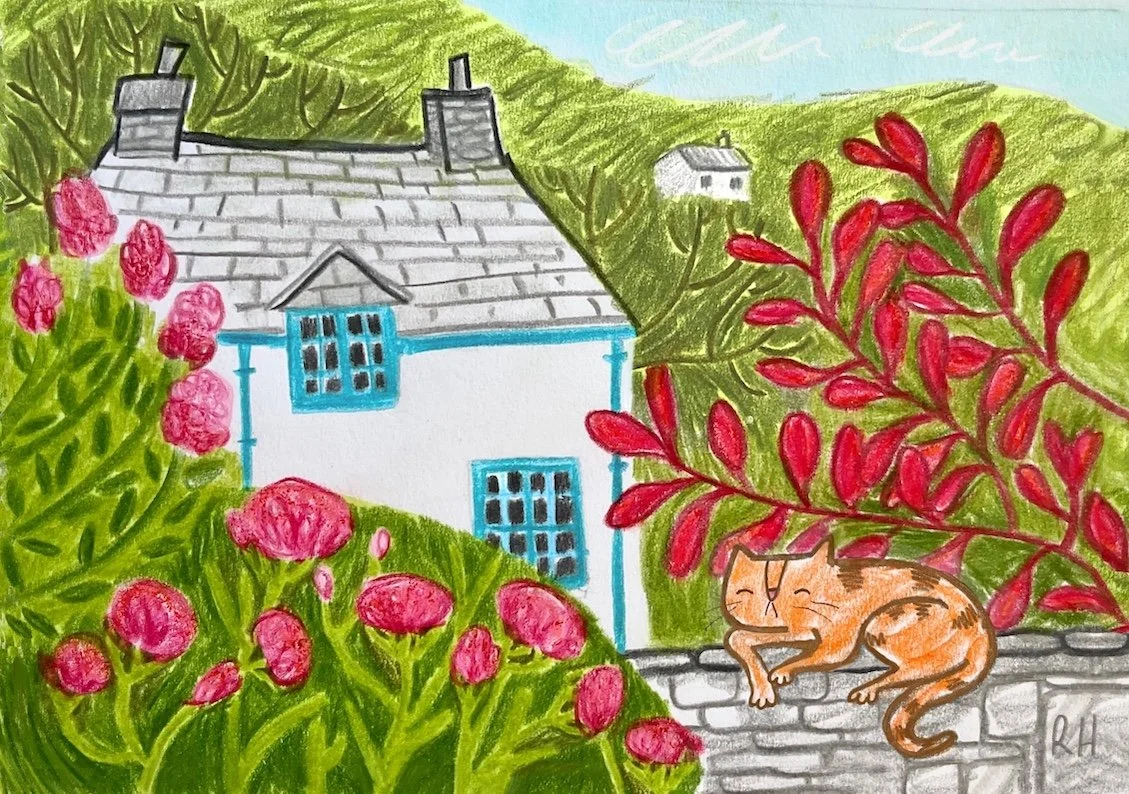My Fourth Newsletter
This newsletter was originally sent out to subscribers in September 2023
Salutations!
In my last newsletter, I talked about one technique that I use to keep my final artwork loose and open to happy accidents. That has absolutely no connection with what's on the agenda for today!
In this unnecessarily long newsletter you shall find:
- Some bad advice for writing children's books,
- Two recommendations of hilarious books for the children or childish in your life,
- The inaugural Word of the Week.
- A lot of long words... My apologies to those for whom English is not a first language. You might not like me after this, or you’ll have learned some new words… or both!
I warned in a previous newsletter that rants might be incoming. This breaks my Keep Newsletters Short rule, but I do love to rant about things that I care about, and one thing that's been on my mind lately is the dumbing-down of children's books. (If you don't want to read my rant, scroll down to the end where you'll find something very… well... unexciting really.)
I suppose that as a homeschool mom, I am inclined to think about this a little differently from the average parent-on-the-street. More than half of the education of my children is reading books - either me reading aloud to them, them looking through books themselves, or my eldest daughter reading to her little sister. So books are not merely temporary entertainment in our house, they're valuable educational resources.
I listen to many podcasts and have done many courses on writing children's books, and some advice that they all have in common is to keep the language at a level suitable for the age range you're writing for. That sounds sensible, doesn't it?
However, in my extensive reading of children's books for all ages (ever since I was a child myself, of course), I've noticed a downward trend in intelligent language and themes (plus a growth in annoying didacticism, but that might need its own rant another day). Many of them are obviously pushing some sort of current popular opinion, using common language in a way most children speak, probably to make their books more sellable.
(What I’ve noticed instead is that books written this way in the USA are almost a different language from those written in the UK, so maybe not such a great selling point after all?)
It's a competitive market, however, and it's grown-ups who buy children's books, not the children themselves. But it seems that parents these days believe that children will not like reading if the words are "too hard." How tempting it is for writers to conform to the pressure of oversimplifying the language, but surely that's patronising to the children, and is certainly not going to help anybody's vocabulary.
I would love to vent my annoyance by giving examples of some children's books that have such dumbed-down writing, but I don't want to name and shame anyone - after all, they just have different opinions and their books still have value (some of them). However, here is an example of excellent polysyllabic writing:
The Pirates' Mixed-Up Voyage by Margaret Mahy is one of the first books I bought when I became a parent because I'd enjoyed it so much as a child. It's a chapter book that appeals to children of pre-reading age all the way up to any pre-teens who still enjoy innocent silliness and absolute nonsense. Here is an excerpt (note all the deliciously "difficult" words):
Captain Wafer sighed, for he couldn't help remembering beautiful Detective Carstairs, whose profusion of golden curls had made such an indelible impression on his manly heart. [...]
"Still it can never be. I am a pirate, addicted to riotous revelry and rascality of all sorts, whereas she is a Detective Inspector devoted to duty and defending the decrees of law and order."
Isn't it lovely? Every word is this book is specially selected and each sentence carefully crafted. (Both Margaret and I love a bit of alliteration.)
Now here is an example of an hilarious book, which does both! Mo Willems, in Goldilocks and the Three Dinosaurs, uses sesquipedalian language AND common speak. For example: the dinosaurs, "for no particular reason," cook three bowls of chocolate pudding "at varying temperatures" in the hope of catching an "innocent little succulent child." How beautifully verbose.
However, a few pages later that same succulent child eats all the chocolate pudding "because, hey, it's chocolate pudding, right?" And the "poorly supervised little girl" doesn't notice the very obvious clues that this "isn't some bear's house, this is some dinosaur's house!"
So, my conclusion is: maybe rules (or opinions) are meant to be broken when it comes to creating diverse amusing and noteworthy children's books.
Congratulations on getting to the end of this newsletter! You now have the privilege of witnessing the birth of a tradition:
I would love to see more intriguing and stimulating words in children's books as well as hear it in our everyday language. That is why, from now on, I shall be including a monthly Word Of The Week section in my newsletters (Word of the Month doesn't alliterate, so Word of the Week it is!) so that we can all develop a more varied and creative vocabulary.
And our first Word of the Week is:
sesquipedalian, which means: a long word.
Or: a person who uses long words.
For example: This newsletter was certainly sesquipedalian, and written by a mad sesquipedalian, but I hope it has left an indelible impression on you.
My next e-mail will be a far shorter - and hopefully less verbose - newsletter about a more visual subject. I promise.




